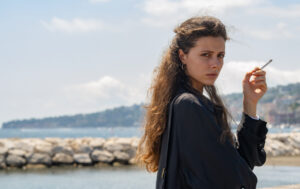Divine Love press conference with Gabriel Mascaro, Dira Paes, Diego Garcia, Jenni Zylka, Livia Serpa
In the Evangelical mission, sex and religion are generally posited in opposition with one another. That is not the case in Gabriel Mascaro’s spellbinding film Divine Love. Sex and religion are completely intertwined. Mascaro admitted that their research didn’t necessarily look to the direction that religion is going but rather they “started to identify various cases in the middle ages where women were considered religious martyrs“. As with the film’s zealous heroine, sexuality placed a transcendental role. The women they were researching “had a divine pleasure with God”.
Within this mindset Mascaro extrapolated how he was also focused on the religious demands on the body from both the female and male perspective. The film tackles male fertility, which juxtaposes the biblical fixation on fertility being a female problem. Mascaro understands the representation of the female body has been exhaustively explored in cinema, he “tried to represent the male body” and connect the male body to this issue.
The director was asked what else inspired him for this film. It is hard to escape the political reality unfurling in Brazil each day. “In Brazil, we are experiencing a cultural change. Culture is being influenced by religion. It is really important to think about it as soon as possible. Every hour a new religious organisation is registered. This country is going through deep cultural changes and there is a conservative agenda gaining ground.” He explained with gravity Bolsonaro’s new mantra is “Brazil over all and God over everybody”.
Dira Paes (Joana) noted: “The main challenge for me as an actress was trying to translate the role faith plays in her life.” The conversation elucidated the relationship of the individual’s body to the state and the tension that arises from the state trying to control them. Mascaro shed light on how this not-so-far-off future helped in projecting this: “It is a political control over the body and we are dealing with the future but it is not very far. The machines are not very intricate. The technologies that are used in the film are already available.”
He illuminated the fact that the church drive-thrus already exist in Brazil as well as confession booths just off the side of the road, admitting that they “added a bit of hype to it”. Mascaro “wanted to show a religion that is highly conservative but highly productive”.
The more technical elements were discussed with one of the film’s editors, Livia Serpa. She noted how open-minded Mascaro was during the editing process: “Because there are so few cuts every shot becomes important. Our challenge was to try to find a balance. We wanted to experience with them the ecstasy.”
The specific aesthetic of Divine Love was demystified by the cinematographer, Diego Garcia, who has now worked with Mascaro for the second time: “We have a very close relationship. Gabriel is an artist who really cares about the image”. The director explained the nature of the Evangelical aesthetic is “very attractive in visual terms. It’s almost a pop religion”.
Ultimately the panel conceded that they were making the film with a sense of urgency. Its prescient content holds specific value today. Mascaro acknowledged he had a sense of this shift going on in Brazil; what they were imaging happening in 2027 is happening now in 2019 with Brazil’s conservative lobby stronger than they could have foreseen. They look forward to the movie as a debate and hope that the ideas will be reflected with care. Their society has become polarised and they understand the necessity to start a dialogue.
Mary-Catherine Harvey
Photo: Thomas Niedermueller/Getty Images
Read more reviews from our Berlin Film Festival 2019 coverage here.
For further information about the event visit the Berlin Film Festival website here.

























Facebook
Twitter
Instagram
YouTube
RSS